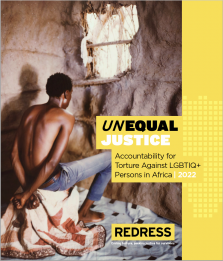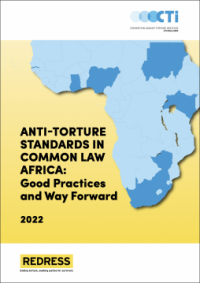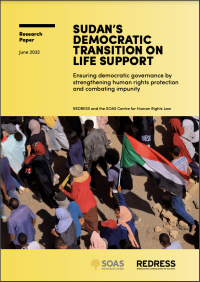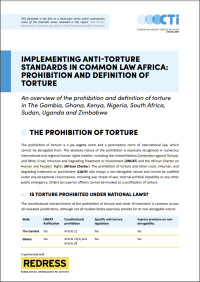This research paper from REDRESS and the SOAS Centre for Human Rights Law situates Sudan’s current political and human rights crisis within the broader historical context, demonstrating that the cyclical nature of Sudan’s post-independence, post-coup politics is closely linked to the absence of respect for the rule of law, human rights protections, and justice for past violations.
In a letter ahead of the Council’s 50th session (13 June to 8 July 2022), REDRESS joined other non-governmental organisations in calling on the UN Human Rights Council to support the adoption of a resolution that ensures continued attention to Sudan’s human rights situation through enhanced interactive dialogues at the Council’s 52nd and 53rd regular sessions.
This report summary highlights the key findings and recommendations of our report Unequal Justice: Accountability for Torture against LGBTIQ+ Persons in Africa. The report sheds light on the violence and torture suffered by LGBTIQ+ people in Africa and the challenges that victims face to secure accountability for these crimes. It examines the situation in 11 countries in Africa - Algeria, Angola, Botswana, the Democratic Republic of the Congo, Ghana, Kenya, Malawi, Morocco, Mozambique, Uganda, and South Africa - but the findings of the research are equally applicable to other contexts in Africa. The report outlines specific proposals to States, African human rights bodies, and civil society to improve the current situation.

This report sheds light on the violence and torture suffered by LGBTIQ+ people in Africa and the challenges that victims face to secure accountability for these crimes. It examines the situation in 11 countries in Africa - Algeria, Angola, Botswana, the Democratic Republic of the Congo, Ghana, Kenya, Malawi, Morocco, Mozambique, Uganda, and South Africa - but the findings of the research are equally applicable to other contexts in Africa.
While discriminatory violence can and often does amount to torture or other ill-treatment, the report finds that States often fail to confront or treat it as such. Many States in Africa afford little to no legal protection to LGBTIQ+ persons, whilst others criminalise same-sex conduct and fail to recognise the full spectrum of sexual orientations and gender identities. In recent years, there has also been a resurgence in legislation which targets, rather than protects, LGBTIQ+ persons. This has resulted in an increase in violence against LGBTIQ+ persons, while impunity remains the norm.
The report, which has a foreword by the UN Independent Expert on sexual orientation and gender identity, Víctor Madrigal-Borloz, outlines specific proposals to States, African human rights bodies, and civil society to improve the current situation.
The Convention against Torture Initiative (CTI) and REDRESS three-part series of factsheets summarises the key thematic areas reviewed in the recent report titled ‘Anti-Torture Standards in Common Law Africa: Good Practices and Way Forward’.
The factsheets review the anti-torture legal and regulatory frameworks in specific States in common law Africa but can be useful for other States and practitioners in the region more broadly. Specifically, the three factsheets analyse:
The extent to which the reviewed States have domesticated the definition and prohibition of torture, the implementation of safeguards against torture for persons deprived of their liberty, and the existing complaints and investigation mechanisms that receive complaints of and investigate allegations of torture and other ill-treatment in the eight States reviewed.
To download a Factsheet, see the ‘Downloads’ menu and click on the Factsheet you would like to download.
REDRESS and the National Gay & Lesbian Human Rights Commission (NGLHRC) made this submission to draw the Committee against Torture’s attention to the issue of discriminatory violence affecting individuals identifying or perceived as LGBTIQ+ in Kenya.
REDRESS and its South African partners, Access Chapter 2, have made a joint submission as part of the Fourth Cycle of the Universal Periodic Review (UPR) of South Africa that will be held in October and November 2022. The submission focuses on the disproportionate violence and other human rights violations experienced by individuals who identify as LGBTIQ+ in South Africa, raises concerns regarding legislative and practical gaps in the protection of LGTIQ+ persons, the State’s failure to prevent, investigate and prosecute acts of violence (including torture and other ill-treatment) and pervasive barriers to justice and redress for victims.

The effective incorporation of anti-torture standards within States’ domestic legal frameworks and their effective implementation in practice is crucial to prevent torture and other ill-treatment, ensure that perpetrators are held accountable, and to provide redress for victims. States in the African region widely reject the practice of torture and other ill-treatment, notably reflected through near regional universality of the UN Convention against Torture (UNCAT) and the widespread ratification of the African Charter on Human and Peoples’ Rights (African Charter) and other human rights treaties. REDRESS and the Convention against Torture Initiative’s report examines the anti-torture legislative and regulatory framework of eight States in common law Africa, namely, The Gambia, Ghana, Kenya, Nigeria, South Africa, Sudan, Uganda and Zimbabwe. It identifies existing good practices and legislative provisions and opportunities for anti-torture legislative and regulatory reforms to inspire action towards strengthening the domestic implementation of UNCAT across the region. It outlines measures and proposals that can be considered by States and their institutions to secure legal protection against torture and other ill-treatment and positively impact torture prevention and response in practice.
REDRESS would like to thank our partners CTI; the law firm Clifford Chance for their support during the drafting and editing process, and the expert members of the Advisory Board of this report: Ms. Aua Baldé, H.E. Mr. Ramses Joseph Cleland, Dr. Alice Edwards, Mr. Gaye Sowe, Ms. Ruth Ssekindi and Prof. Frans Viljoen.




